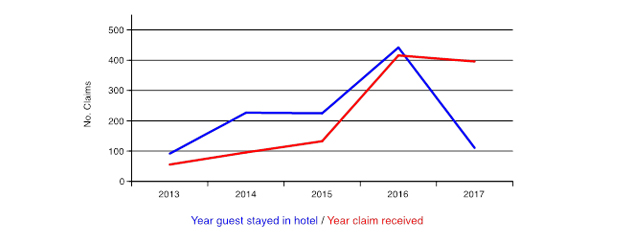Data analysis suggests a drop in fraudulent cases, says Professor Rodney Cartwright and Dr Esteban Delgado
In Majorca, Preverisk, a company providing support to hoteliers who receive sickness claims against them, has analysed claims for sickness received by hoteliers in Majorca, Southern Spain, Benidorm, the Canaries, Egypt and Turkey since 2013.
Majorca was one of the destinations that was targeted by claims management companies (CMCs) which led to the significant increase in false sickness claims.
A sudden increase in claims relating to 2016 was identified but is now fortunately reducing to previous levels.
The graph and accompanying chart illustrate the changes and also the time lag, frequently two to three years, that may occur between the guests staying in the hotel and receipt of a claim. More claims can be expected for some of the years shown.

Year guest stayed in hotel / Year claim received
| 2013 | 2014 | 2015 | 2016 | 2017 | Totals | |
| 2013 | 56 | 14 | 6 | 14 | 2 | 92 |
| 2014 | 82 | 43 | 75 | 27 | 227 | |
| 2015 | 84 | 85 | 56 | 225 | ||
| 2016 | 242 | 200 | 442 | |||
| 2017 | 111 | 111 | ||||
| Totals | 56 | 96 | 133 | 416 | 396 | 1097 |
The Preverisk data clearly shows the effect of the 2016 increase in sickness claims on hoteliers.
The unexpected increase was recognised within the industry in late 2016. The claims were unlike the group actions of the late 1990s and 2000s in that hotels and resort staff were not receiving reports of sickness in resort.
These ‘new’ claims were unsubstantiated with no supporting evidence and many followed approaches by Claims Management Companies using aggressive sales tactics, including cold calling, recruiting resort-based salespeople, and even dressing up as tour operators at hotels to reel in customers.
Tour operators and hoteliers supported by Abta, the British Foreign Office and consumer right group Holiday Travel Watch also expressed their concern, reminding tourists that false claims amounted to fraud and that under no circumstances should consumers be tempted or encouraged to make false claims for their holiday complaints. The consequences of doing so could have a major impact on their life.
In the middle of 2017, Abta launched the Stop Sickness Scams campaign. In addition to an intensive press campaign, they promoted seminars for tour operators and arranged meetings with the UK Ministry of Justice to close a loophole in legislation that was introduced to help stop the surge in fraudulent “whiplash” claims, but which excludes overseas claims.
In the press release they stated that police forces in popular tourist destinations were taking action. In Majorca, the Federation of Majorcan Hotels warned that Majorcan hotels would be cracking down on claims touts and UK holidaymakers submitting fake claims.
Police in the UK and resort countries actively investigated cases of suspected fraudulent claims and tour operators took court action against tourists making such claims. A number of successful court cases followed with prison sentences and considerable fines being levied.
Has all this activity resulted in a reduction of fraudulent claims? There have been reports in the media indicating that individual operators have seen a reduction in cases. The Preverisk data provides evidence of a similar reduction in claims to hoteliers.
The response of the industry, hoteliers, tour operators and civil authorities both in holiday resorts and the UK demonstrates how effective combined actions can be.
The data presented by Preverisk provides valuable information on the beneficial effect to hoteliers of such combined actions.
Preverisk stresses, however, that true episodes of illnesses do occur and all claims should be treated seriously and be properly investigated by a competent claims management company.
